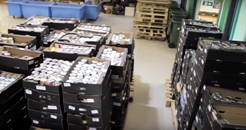 Have foodbanks politicised kindness?
Have foodbanks politicised kindness?
Is this true today? When a neighbour is in need, people in the neighbourhood rally round and help them e.g. provide food, look after kids, etc. It is an unmeasured, normal thing to do – kindness to others. It is done 'by' the community using the assets they have rather than done 'to' them. Countless acts of kindness which go unreported, and they do not look for outside funding/help.
You probably agree that we have increasingly lost that sense of community now in many places and I can understand there are many reasons for this e.g. time poverty, work relationships outside of area, looking to the state to do something, lack of community events, etc.
As part of this train of thought, I have had a concern that the Church has contributed/is contributing to that by institutionalising help. Let’s take foodbanks. Ostensibly, this is about members of the community who want to help others in the community, buying food and letting an institution distribute it as required. It’s a great initiative.
However, what this does is break is any sense of relationship/connection between the provider i.e. the person buying the food and receiver i.e. the recipient of a 3 day parcel. There is a general connection but only in the same way as donating to a charity shop - there is no personal feedback even. The loss of relationship is a loss to community life – it removes the need to ‘know’ your neighbour, to understand what other help they may need, what assets they have to enrich community life. It focuses knowledge within a few individuals e.g. voucher issuers, foodbank helpers. I know foodbank volunteers are great people, compassionate individuals but there are just too many relationships to develop and maintain. At worse, the relationship becomes transactional and statistical - the visit being logged and the recipient referred to other services.
Another thought is that it creates a loss of personal charity in the community – ‘you need to go to the foodbank – they will help you’. Could it increase a sense of shame – having to approach a charity/building with strangers rather than a known neighbour for help?
What it also does enable is the politicisation of kindness. Where neighbours helped each other as part of community life in an unsung way, we now have headlines about number of food parcels given out which is used in various ways to attack various policies. It creates nasty politics.
I’ve had a few thoughts on this and they are mostly about how to engage the community more. Here are some tentative ones:
-
Could the 3 day food parcels be given to church-going neighbours of the intended recipient to engage them in the issues a person is having? The recipient would call the foodbank and the staff there would contact the nearest neighbour to collect and deliver the parcel, spending time with the neighbour. This could lead to the start of a different relationship rather than the one at the foodbank. It would also engage the whole church in outward social action rather than a few individuals in the foodbank.
-
Could church-going neighbours be contacted to help cook a meal or, in some circumstances, develop the recipient's cooking skills?
-
Could the recipient family be invited along to a group meal and help cook that meal? This develops a sense of involvement ('by' not 'to') and belonging to a wider group.
-
Could ‘key’ neighbours be appointed, especially in parts of towns with high foodbank use and they distribute very locally and involve others to help?
-
Could donation points stress that if donors can help a neighbour directly, then buy food for them rather than donate?
You may have other ideas. What the suggestions above do not do is link the donor to the recipient or at least tell the donor the difference they have made. Maybe something can be done here?
I hope the above is not taken negatively. Foodbanks have served and are serving a great purpose and the suggestions above try to improve the model by seeking to restore the link neighbour to neighbour and strengthen community. Don't we all want that?
Retweet about this article:
Geoff Knott, 21/12/2021